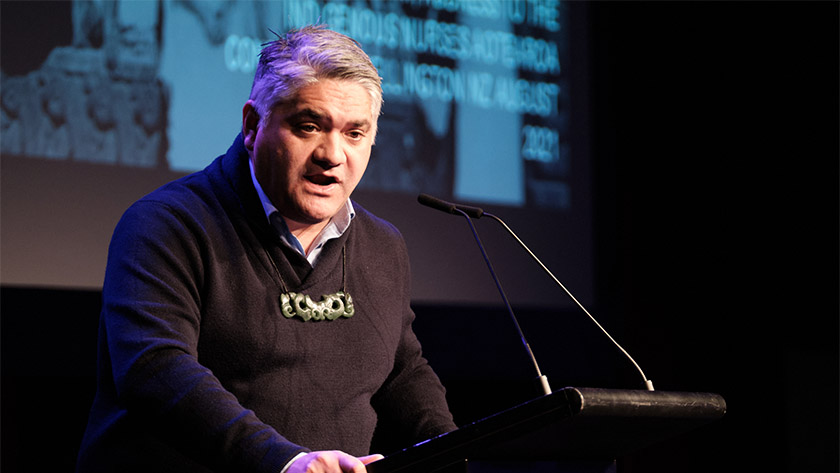Speaking at the 2021 Indigenous Nurses Aotearoa Conference, Matthew Tukaki said he was surprised when asked to take on the role.
Tukaki (Ngāi te Rangi, Mataatua, Te Whānau-A-Apanui) worked his way up from living rough in Sydney, to leading the Australian operations of one of the world’s largest recruitment companies.
After returning to Aotearoa, he took on roles with groups such as the Ministry of Health’s Māori Health Monitoring Group, and chairs the Ministerial Advisory Board for Oranga Tamariki (OT).
The OT appointment was part of a series of responses by Minister for the agency Kelvin Davis, to controversy over its treatment of Māori.
Tukaki said more than 70,000 “of our tamariki and our mokopuna” came into the state system through notifications every year. From that, 40,000 became “a report of concern”, leading to more than 8000 family group conferences: and that led to about 5400 children in care.
“As of March 31, 2021, 67 per cent of those… were Māori. That is the wall we have to climb.”
When the board’s recommendations were released in late August [planned before the latest COVID-19 outbreak] the focus would be on prevention, he said.
“Why is that important? Because a third of those numbers, of notifications, come from the health system. They come from our GP practices, and our hauora [services] and in fact what we do is we channel them down without preventing them in the first place.”
MHA an opportunity
Tukaki saw an opportunity for the Māori Health Authority (MHA) to be an “intersection” – for inter-agency connections – for Māori social services as well.
Tukaki welcomed planned changes to the district health board (DHB) structure – amalgamation into Health NZ (HNZ).
“I’ve never been a fan of the DHBs because the DHBs have got nothing for us… what have the DHBs done for Māori health?”
He supported the planned MHA, but the “main prize” was HNZ.
“What we need to do, and which is one of the jobs that I have, is to ensure that there’s equity and balance in the governance structure of Health New Zealand.”
The long-term plan for health in Aotearoa must be the complete reversal of all Māori health disparities. “Every single one.”
‘We need to ensure equity and balance in HNZ.’
This included greater support for regional and provincial health services, covering everything from dialysis to cancer services.
“The days of forcing our whānau to go to Auckland, Wellington and Christchurch, for cancer treatment for example, it has to be over in our aspiration.
“In fact we need to be doing more to prevent them from having these diseases in the first place.”
This was why Te Hiringa Hauora, the Health Promotion Agency (a Crown entity working under the Māori Health Strategy) needed to be turned over to “Māori interests and aspirations as well”, he said.





